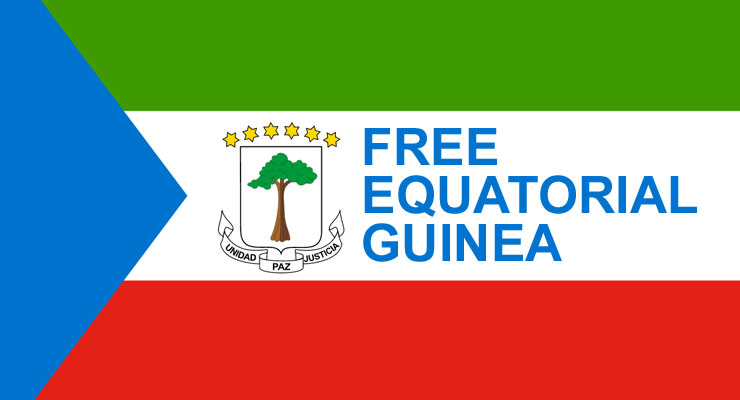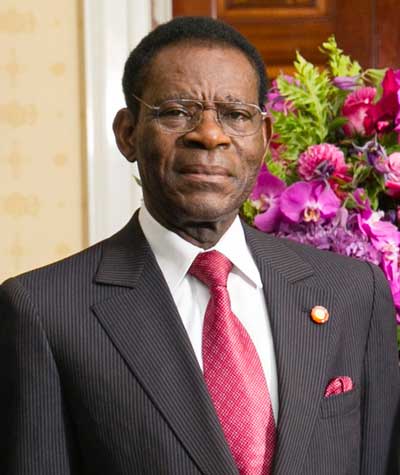
There are countries most people have never even heard of and have little reason to know exist. But that doesn’t mean strange things don’t happen in them and the Republic of Equatorial Guinea (E.G.) is one such place. About the size of Maryland, it fits into the “corner” of West-Central Africa near Nigeria. It popped up in the news lately because its Vice President T.O. Nguema of the ruling family is on trial in absentia in France.
He is on trial for corruption and the International Court of Justice has busted through the shield of his diplomatic immunity to prosecute him, an unusual action itself. It is an interesting case because the corruption is so spectacular, and the history behind it is so unjust.
Consider exactly how corrupt a dictatorship must be for the Swiss, private bankers to the worst sorts of people, to do this, to a diplomat and Vice President:
“In November, Swiss authorities seized 11 cars belonging to Mr. Obiang, accusing him of money-laundering. Among them was reportedly a Porsche valued at more than $830,000 and a Bugatti Veyron which sells for $2m.” (BBC)
It is a tight case against the ruling Obiang family, given most Equato-Guineans who are not related to the president live in malarial poverty. Additionally, the BBC reports: “the US had filed claims against his US-based assets worth more than $70m, alleging they were proceeds of corruption”.
E.G.’s history is equally horrid. Colonized by Spain (the Spanish rarely colonized in Africa), it won independence comparatively lately, in 1968. Most of the Spanish ruling class left, which was prescient because the Spanish installed President (for life) Marcias Nguema who turned out to be perhaps Africa’s worst dictator. Among other achievements he killed a tenth of the population, wrecked most boats (so the citizenry couldn’t flee – half the county is an island), and destroyed by negligence or stupidity the only viable export – the cash crop cocoa. He cut E.G. off from the world entirely – almost nobody was admitted, and emigration was punishable by death.
Throughout the 1970s Nguema singlehandedly wrecked his country but his nearly forgotten crimes deserve remembering, if only for posterity. Once he had a group of dissidents publicly shot in country’s only stadium to the musical accompaniment of Paul McCartney/Mary Hopkins’ song “Those Were The Days.”
Frequently high on bhang (marijuana) he’d conduct meetings at the Presidential Palace in remote Mongomo surrounded by the skulls of his executed politicians. It was an “African Dachau.” His foreign policy was a bizarre pastiche which made sense only to a barely literate constantly high psychopath – himself. Nigeria evacuated its citizens there who had been enslaved.
In 1979 with the economy and society reduced to forced-labor and barter, President Nguema’s nephew Teodoro Obiang staged a successful coup. Deposed President-uncle Nguema, 55, tried to flee with the national treasury in a suitcase which he proceeded to burn in the jungle while running – physically running – with that flaming suitcase, pursued by soldiers towards neighboring Gabon.
Happily he didn’t get far. He was caught, tried in a cinema, the courts having been destroyed in every sense, and ultimately executed by a firing squad of Moroccan soldiers (his former praetorian guard), because the locals believed he couldn’t be killed by mere bullets. Witchcraft took a front seat during those years.
Come 1979 and the ex-president Nguema’s nephew now President (for life, again) Obiang took charge: same “Fang-Esangui” clan as his uncle, but a more efficient, less insane dictatorship. Teodoro Obiang is still the President “in fact” 38 years later. He is Africa’s longest serving head of state.

Less drug crazed than his uncle, Obiang is just as corrupt and brutal. Until 1998 Equatorial Guinea was a remote backwater of tropical forests, few roads, and a long suffering population living removed from the modern world.
Then came oil, lots of it. The Bight of Biafra, south of Nigeria, is horribly cursed with oil. With oil came presidential Swiss bank accounts, son Teodoro Jr. and his $35M Malabu, CA, mansion, those recently impounded sports cars, and cool presidential jets. On a grander scale the family are building a new capital city, a snazzy monstrosity named Oyala in the middle of the jungle. Teodoro Jr. is a Michael Jackson fan, bought M.J.’s bejeweled glove for his collection and he owns a Batmobile.
Since independence E.G. has been a set piece of bad government and the “resource curse” made it worse. A friend of your correspondent, former U.S. Ambassador John Bennett, was expelled for “sorcery” which, it turned out, was his cleaning the tombstones of some British airmen who died in WW II – as a diplomatic courtesy to our British allies. The real reason for Ambassador Bennet’s expulsion was for aiding the loyal opposition by using the embassy’s photocopier to print their leaflets. This was before that same loyal opposition leader, Placido Mico was arrested and kept in a coffin-sized cell for four months.
Wikileaks diplomatic cables provide a peek into the Department of State’s view of E.G.’s government in recent years: of the terrible corruption, unseemly ruling family, and general embarrassment to know. State’s take, broadly, is that (paraphrasing here) – at least they’re “our” bastards, the Nguemas, they’re nice to our oil companies…. and a dictatorship is better than chaos and strife like next door in Nigeria. Realpolitik if there ever was. Now, with an oil guy as the next Secretary of State, don’t expect our democratic American values to be pushed in E.G. anytime soon. Secretary of State Rex Tillerson (or as one journalist wag called him: “Oily McPetrolface”) isn’t the type to press human rights standards upon dictators. Let’s hope the International Court of Justice will try.
Suggested further reading:
- An authoritative history by Max Liniger-Gourmaz titled “Small Is Not Always Beautiful: Story of Equatorial Guinea“
- A very depressing read by the NGO EG Justice about human rights
- A good look at the perils of working in Equatorial Guinea in particular, and development in general by Robert Klitgaard titled “Tropical Gangsters: One Man’s Experience With Development And Decadence In Deepest Africa“
- Randal Fegley’s “Equatorial Guinea (World Bibliographical Series)“
Leave a Reply